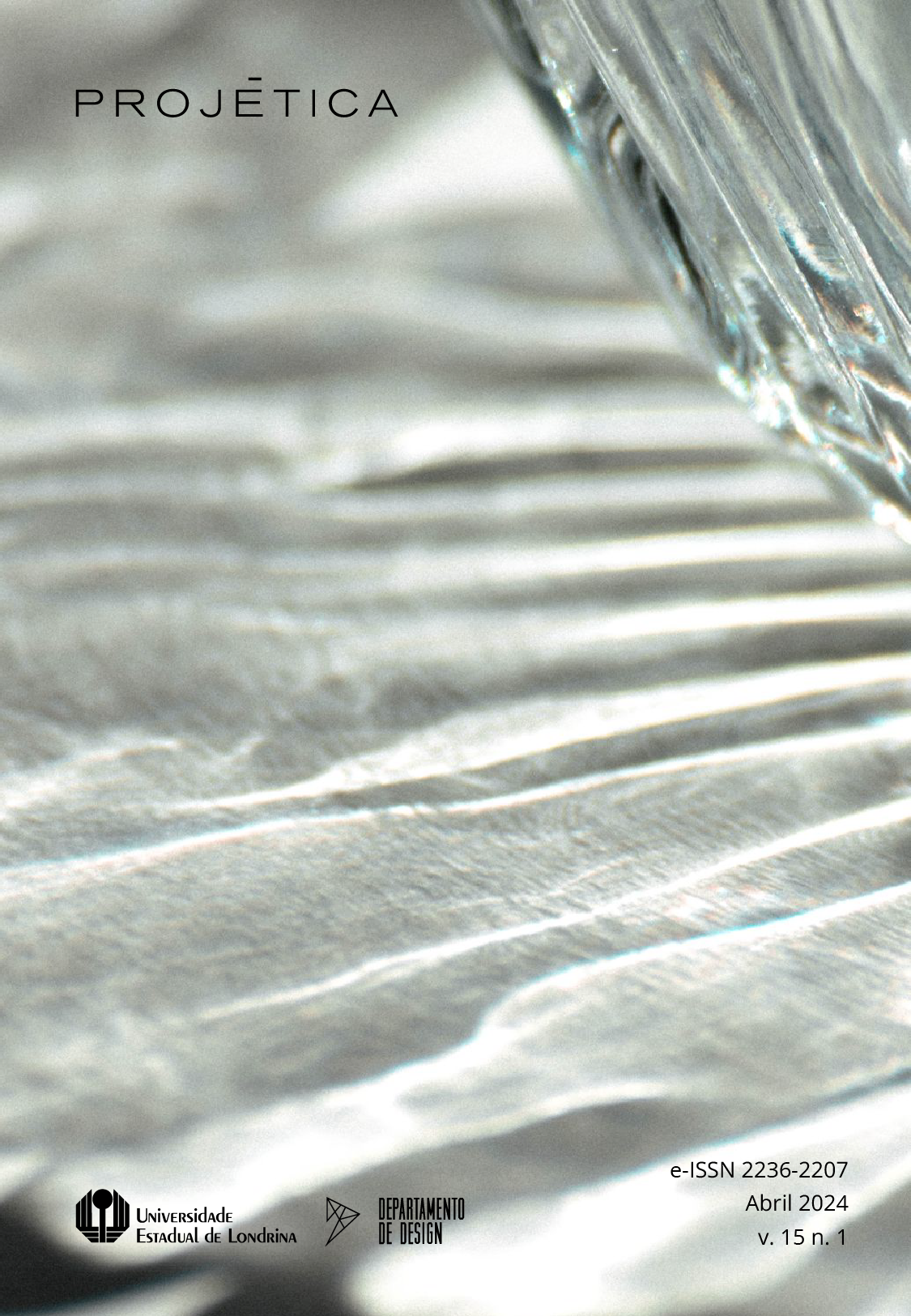Dressability of jogger pants and socks by people with Parkinson's disease
difficulties in dressing and undressing
DOI:
https://doi.org/10.5433/2236-2207.2024.v15.n1.48606Keywords:
usability, inclusive design, ElderlyAbstract
People with Parkinson's disease may be impaired in many daily activities, including dressability (clothes usability). The study aimed to understand how the characteristics of clothing design influence the difficulty in dressing and undressing pants and socks. The results indicate a significant (p<0.05) decrease in efficiency and satisfaction when compared with a control group. Discussions point out that the design of these clothes should be planned with new inclusive applications considering the characteristics of these users.
Downloads
References
ARAÚJO-SILVA, Fabiana; SANTINELLI, Felipe B.; IMAIZUMI, Luis Felipe I.; SILVEIRA, Aline P. B. Temporal dynamics of cortical activity and postural control in response to the first levodopa dose of the day in people with Parkinson’s disease. Brain Research, Amsterdam, v. 1775, p. 147727, 2022. DOI: https://doi.org/10.1016/j.brainres.2021.147727
BLOEM, Bastiaan R.; OKUN, Michael S.; KLEIN, Christine. Parkinson's disease. The Lancet, London, GB, v. 397, n. 10291, p. 2284-2303, 2021. DOI: https://doi.org/10.1016/S0140-6736(21)00218-X
DANCEY, Christine P.; REIDY, John. Statistics without maths for psychology: using SPSS for windows. Harlow: Prentice Hall, 2007.
FISHER, James M.; HAMMERLA, Nils; PLOETZ, Thomas; ANDRAS, Peter. Unsupervised home monitoring of Parkinson's disease motor symptoms using body-worn accelerometers. Parkinsonism & related disorders, Kidlington, OX, v. 33, p. 44-50, 2016. DOI: https://doi.org/10.1016/j.parkreldis.2016.09.009
GRUBER, Crislaine; MERINO, Eugenio A. D.; MERINO, Giselle S. A. D.; VERGARA, Lizandra G.L. O vestir na vida dos idosos: contribuições da ergonomia e das tecnologias assistivas. ModaPalavra e-periódico, Florianópolis, SC, n. 19, p. 149-178, 2017. DOI: https://doi.org/10.5965/1982615x10192017150
HABETS, Jeroen G. V.; HERFF, Christian; KUBBEN, Pieter; TEMEL, Yasin; BLOEM, Bastiaan R.; STARR, Philip A. Rapid dynamic naturalistic monitoring of bradykinesia in Parkinson’s disease using a wrist-worn accelerometer. Sensors, New York, US, v. 21, n. 23, p. 7876, 2021. DOI: https://doi.org/10.3390/s21237876
HARIZ, Gun-Marie; FORSGREN, Lars. Activities of daily living and quality of life in persons with newly diagnosed Parkinson’s disease according to subtype of disease, and in comparison to healthy controls. Acta Neurologica Scandinavica, Copenhagen, DK, v. 123, n. 1, p. 20-27, 2011. DOI: https://doi.org/10.1111/j.1600-0404.2010.01344.x
HOEHN, Margaret M.; YAHR, Melvin D. Parkinsonism: onset, progression and mortality. Neurology, New York, US, v. 17, n. 5, p. 427–442, 1967. DOI: https://doi.org/10.1212/WNL.17.5.427
HSSAYENI, Murtadha D.; BURACK, Michelle A.; JIMENEZ-SHAHED, Joohi; GHORAANI, Behnaz. Assessment of response to medication in individuals with Parkinson’s disease. Medical Engineering & Physics, London, GB, v. 67, p. 33-43, 2019. DOI: https://doi.org/10.1016/j.medengphy.2019.03.002
HUGHES, Andrew J.; DANIEL, Susan E.; KILFORD, Linda; LEES, Andrew J. Accuracy of clinical diagnosis of idiopathic Parkinson’s disease: A clinico-pathological study of 100 cases. Journal of Neurology and Psychiatry, London, v. 55, n.3, p. 181-184, 1992. DOI: https://doi.org/10.1136/jnnp.55.3.181
KOVAR, Mary G.; LAWTON, Powell M. Functional disability: activities and instrumental activities of daily living. Annual review of Gerontology and Geriatrics, Hanover, v. 14, p. 57-57, 1994.
MANCINI, Martina; CARLSON-KUHTA, Patricia; ZAMPIERI, Cris; NUTT, John G.; CHIARI, Lorenzo; HORAK, Fay B. Postural sway as a marker of progression in Parkinson's disease: a pilot longitudinal study. Gait & Posture, Oxford, GB, v. 36, n. 3, p. 471-476, 2012. DOI: https://doi.org/10.1016/j.gaitpost.2012.04.010
MARTELI, Letícia Nardoni; BARBIERI, Fabio A.; GERIZANI, G.; NEVES, Erica P. das; PASCHOARELLI, Luis C. Impact of manual coordination on usability of clothing fasteners in people with Parkinson’s disease. Ergonomics in Design, Thousand Oaks, CA, v. 31, n. 4, p. 14-22, 2021. DOI: https://doi.org/10.1177/10648046211005573
MARTELI, Letícia Nardoni; PASCHOARELLI Luis Carlos; TRIGUEIROS, Paula; BARBIERI, Fabio A. Case study on the experience and perception of rehabilitators and caregivers of people with Parkinson's disease in the Interaction with clothing assistive devices: narratives about everyday problems, in Portugal. In: MARTINS, Nuno; Brandão, Daniel (ed.). Advances in design and digital communication II. New York: Springer, 2021. p. 412-424. (Springer Series in Design and Innovation, v. 19). DOI: https://doi.org/10.1007/978-3-030-89735-2_34
MATHIOWETZ, Virgil; VOLLAND, Gloria; KASHMAN, Nancy; WEBER, Karen. Adult norms for the Box and Block Test of manual dexterity. American Journal of Occupational Therapy, Thousand Oaks, CA, v. 39, n. 6, p. 386-391, 1985. DOI: https://doi.org/10.5014/ajot.39.6.386
NARDONE, Antonio; SCHIEPPATI, Marco. Balance in Parkinson's disease under static and dynamic conditions. Movement disorders: official journal of the Movement Disorder Society, New York, NY, v. 21, n. 9, p. 1515-1520, 2006. DOI: https://doi.org/10.1002/mds.21015
NASREDDINE, Ziad S.; PHILLIPS, Natalie A.; BÉDIRIAN, Valérie; CHARBONNEAU, Simon; WHITEHEAD, Victor; COLLIN, Isabelle; CUMMINGS, Jeffrey L.; CHERTKOW, Howard. The Montreal cognitive assessment, MoCA: a brief screening tool for mild cognitive impairment. The American Journal of Geriatric Psychiatry, Amsterdam, v. 53, n. 4, p. 695-699, 2005. DOI: https://doi.org/10.1111/j.1532-5415.2005.53221.x
PODSIADLO, Diane; RICHARDSON, Sandra. The timed "Up & Go": a test of basic functional mobility for frail elderly persons. Journal of the American Geriatrics Society, Montvale, NJ, v. 39, n. 2, p. 142-148, 1991. DOI: https://doi.org/10.1111/j.1532-5415.1991.tb01616.x
SERDAR, Ceyhan C.; CIHAN, Murat; YÜCEL, Doğan; SERDAR, Muhittin A. Sample size, power and effect size revisited: simplified and practical approaches in pre-clinical, clinical and laboratory studies. Biochemia Medica, Zagreb, v. 31, n. 1, p. 27-53, 2021. DOI: https://doi.org/10.11613/BM.2021.010502
SHULMAN, Lisa M.; PRETZER‐ABOFF, Ingrid; ANDERSON, Karen E.; VAUGHAN, Christopher; GRUBER-BALDINI, Ann. Subjective report versus objective measurement of activities of daily living in Parkinson's disease. Movement Disorders, New York, v. 21, n. 6, p. 794-799, 2006. DOI: https://doi.org/10.1002/mds.20803
SPERLING, Leon; KARLSSON, Marianne. Clothing fasteners for long-term-care patients: evaluation of standard closures and prototypes on test garments. Applied Ergonomics, Oxford, v. 20, n. 2, p. 97-104, 1989. DOI: https://doi.org/10.1016/0003-6870(89)90130-0
UZOCHUKWU, Jennifer C.; STEGEMÖLLER, Elizabeth L. Repetitive finger movement and dexterity tasks in people with Parkinson's disease. The American Journal of Occupational Therapy, Boston, Mass, v. 73, n. 3, p. 1-8, 2019. DOI: https://doi.org/10.5014/ajot.2019.028738
Downloads
Published
How to Cite
Issue
Section
License
Copyright (c) 2023 Leticia Nardoni Marteli, Luis Carlos Paschoarelli, Paula Trigueiros, Fernando Moreira da Silva, Fabio Augusto Barbieri

This work is licensed under a Creative Commons Attribution 4.0 International License.
Projética está licenciada sob a Creative Commons Attribution CC-BY 4.0 International. Os autores detém os direitos autorais e concedem à revista o direito de exclusividade de primeira publicação.
Os autores dos trabalhos aprovados autorizam Projética a, após a publicação, ceder seu conteúdo para reprodução em indexadores de conteúdo, bibliotecas virtuais e similares.
Os autores assumem que os textos submetidos à publicação são de sua criação original, responsabilizando-se inteiramente por seu conteúdo em caso de eventual impugnação por parte de terceiros. As opiniões emitidas pelos autores dos artigos são de sua exclusiva responsabilidade.
A revista se reserva o direito de efetuar, nos originais, alterações de ordem normativa, ortográfica e gramatical, com vistas a manter o padrão culto da língua e a credibilidade do veículo. Respeitará, no entanto, o estilo de escrever dos autores. Alterações, correções ou sugestões de ordem conceitual serão encaminhadas aos autores, quando necessário. Nesses casos, os artigos, depois de adequados, deverão ser submetidos a nova apreciação. As provas finais não serão encaminhadas aos autores.
Funding data
-
Fundação de Amparo à Pesquisa do Estado de São Paulo
Grant numbers 2018/20678-5











